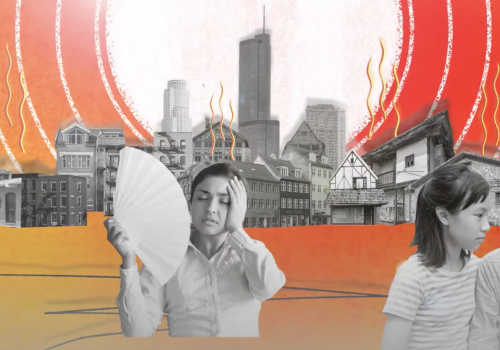About the event
December 5th at 8:30 AM ET/14:30 CET
The world is getting hotter. A little more than one degree of global warming may not sound like much, but it means that the planet is already hotter than any world any human has ever known. Today, 1.7 billion people living in urban areas are exposed to extreme levels of heat. This number will rise dramatically as the planet gets hotter and hotter, and more people move to urban areas.
Extreme heat kills. It is linked to more deaths than all other climate-driven hazards combined – 365,000 deaths in 2019 alone. The rising heat is also damaging economies. By 2030, heat stress will wipe out $2.4 trillion from the world’s economy. It is also one of the biggest climate-justice issues we face, exposing and deepening the growing inequality we see around the world today.
To face this challenge, global experts have joined hands to build a new online tool to provide users with an actionable framework to assess, plan, implement and evaluate heat resilience strategies with technical resources, case studies of best practices for mitigating and adapting to extreme heat, and a filterable inventory of solutions applicable to local contexts.
In this webinar, we will:
- Present the Heat Action Platform to a relevant network of stakeholders
- Collect feedback on its structure, usability and content
- Highlight opportunities for partnership and collaboration on the next steps for the platform
About the Heat Action Platform
What is the platform?
The Heat Action Platform, launched in May 2022 at the World Economic Forum, is intended to be an online one-stop shop where users—particularly practitioners, policymakers, and development finance institutions—can learn how to reduce the risks and impacts of heat. It was developed by the Adrienne Arsht-Rockefeller Foundation Resilience Center (Arsht-Rock), the UNEP-led Cool Coalition, the Global Covenant of Mayors for Climate and Energy, Mission Innovation, and RMI, in partnership with the WEF’s Global Commission on BiodiverCities by 2030.
What gap is the platform intended to fill?
Many resources related to heat planning and adaptation already exist, but there is no go-to online repository where best practice resources are all in one place and organized coherently within educational and analytical frameworks, alongside additional decision-support tools. The platform will enable users to develop a robust approach to mitigating the effects of climate change, as well as reduce carbon emissions from mechanical cooling and make a much better environment for residents and community to live and work.
Platform Scope and Structure
The intended audiences for the platform are city, regional, or national practitioners, policymakers, and development finance institutions. The platform consists of 9 educational modules, intended to guide users through the process of assessing heat risk and vulnerability, planning for how to keep people safe from the heat, and implementing and monitoring heat-related plans and projects.
The centerpiece of the platform is the Heat Policy Tool, which is a filterable repository of 90 heat resilience solutions, with a growing database. Each “solutions card” contains a combination of a specific policy (e.g., mandate, tax incentive, public commitment) and an intervention (e.g., green infrastructure, cool roofs). The goal of the tool is for users to be able to find policies and solutions that are more tailored to their specific circumstances and not a set of generic policy recommendations.
New resources and tools will be continually added to the tool, and platform content will be updated – this platform must be a living resource because heat planning is a dynamic and rapidly changing space. After conducting user testing in Fall/Autumn 2022, we plan to pilot that platform with 2-4 city, regional, or national governments and a select group of development finance institutions next year. Our hope is that through this process, the platform can become the center of gravity for anyone who is concerned about how heat is impacting them, their communities, or their constituents and partners.
